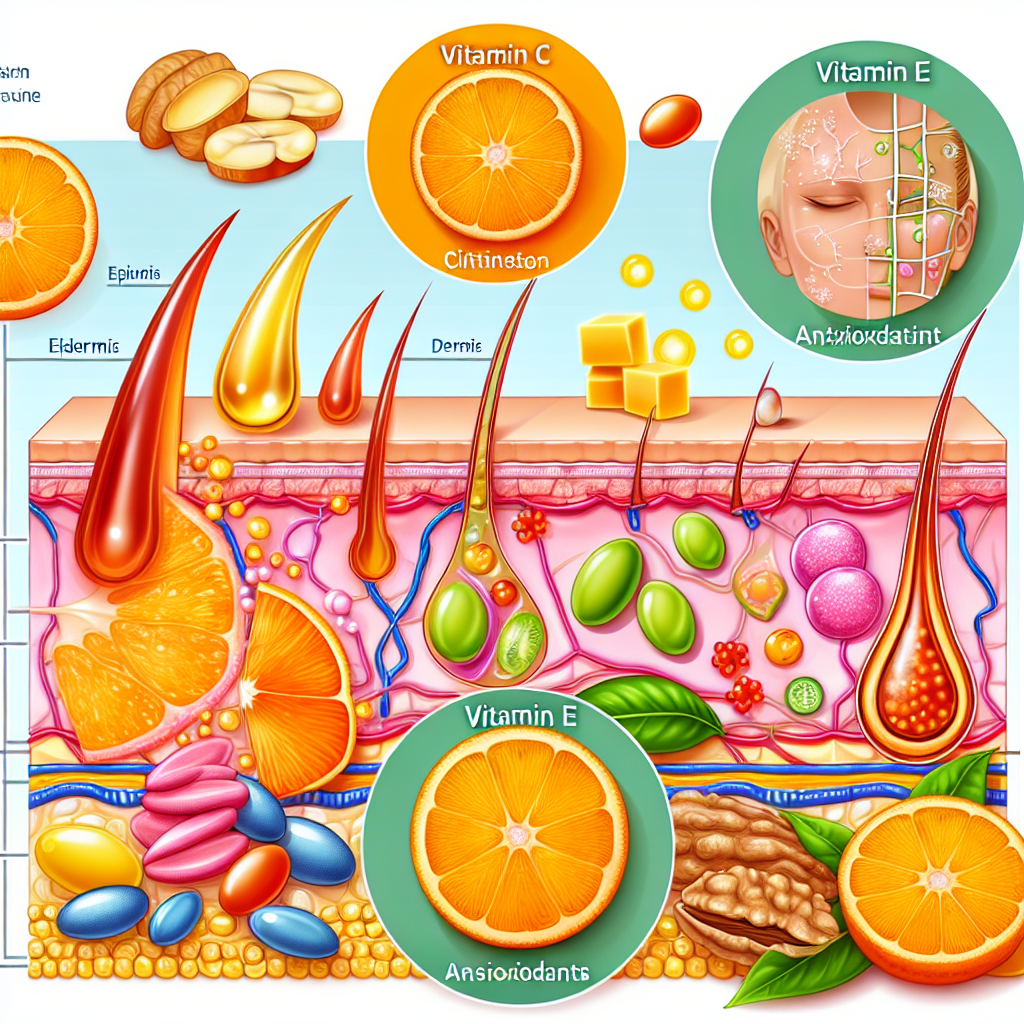How Vitamin C and E Keep Your Skin Glowing

Discover how Vitamins C and E can keep your skin glowing! Learn more about their benefits and how to incorporate them into your skincare routine. Don’t wait, start your journey to healthier, radiant skin today. Click here to find out more.
The Role of Vitamin C and E in Achieving Radiant Skin
The quest for radiant, glowing skin is a journey that many embark on, but few truly understand. While there are countless skincare products and treatments available in the market, the secret to achieving that coveted glow may lie in something as simple as the vitamins we consume. Specifically, vitamins C and E have been found to play a crucial role in maintaining and enhancing the health and appearance of our skin.
Vitamin C, also known as ascorbic acid, is a potent antioxidant that is essential for the growth, development, and repair of all body tissues. It is involved in numerous body functions, including the formation of collagen, absorption of iron, proper functioning of the immune system, wound healing, and maintenance of cartilage, bones, and teeth. When it comes to skin health, vitamin C is a superstar. It aids in the skin’s natural regeneration process, which helps the body repair damaged skin cells. This means that it can help to reduce the appearance of wrinkles, fine lines, and other signs of aging.
Moreover, vitamin C has been found to have a brightening effect on the skin. It can help to fade pigmentation and smooth the skin’s surface to reduce dullness. This gives the skin a youthful glow and helps to even out skin tone. Additionally, vitamin C can help to shield the skin from the visible impacts of environmental stressors, including free radical damage. Free radicals are unstable molecules that can damage the cells in your body, leading to aging and disease. By neutralizing these harmful molecules, vitamin C can help to protect the skin and maintain its youthful appearance.
On the other hand, vitamin E is another powerful antioxidant that can help to nourish and protect the skin. It is fat-soluble, which means it can be stored in the body’s fatty tissue and used as needed. Vitamin E is known for its ability to help protect the skin from damage caused by free radicals from UV exposure. This can help to prevent dark spots and wrinkles, and it can also keep the skin looking youthful and smooth.
Furthermore, vitamin E has moisturizing and healing benefits. It helps to strengthen the skin barrier function, which can help to lock in moisture and keep the skin hydrated. This can give the skin a plump, dewy appearance, which is often associated with a healthy glow. Vitamin E can also help to soothe and calm the skin, making it a great option for those with sensitive or irritated skin.
In conclusion, vitamins C and E are essential for maintaining healthy, glowing skin. They offer a range of benefits, from brightening the skin and reducing signs of aging to protecting the skin from environmental damage and keeping it hydrated. By incorporating these vitamins into your skincare routine and diet, you can help to enhance the health and appearance of your skin. Remember, the journey to radiant skin is not a sprint but a marathon. It requires consistency, patience, and the right nutrients, including vitamins C and E.
Unlocking the Secret to Glowing Skin: The Power of Vitamins C and E

Unlocking the secret to glowing skin is a quest that many embark on, but few truly master. The beauty industry is saturated with products promising to deliver radiant, youthful skin, but the truth is, the key to achieving this lies in the power of vitamins, specifically Vitamin C and E. These two vitamins are potent antioxidants that play a crucial role in maintaining skin health and radiance.
Vitamin C, also known as ascorbic acid, is a water-soluble vitamin that is essential for the synthesis of collagen, a protein that provides structure and elasticity to the skin. As we age, our skin’s natural collagen production decreases, leading to the formation of wrinkles and fine lines. By boosting collagen production, Vitamin C helps to maintain skin’s firmness and elasticity, thereby reducing the appearance of these aging signs.
Moreover, Vitamin C is a powerful antioxidant that protects the skin from damage caused by free radicals. Free radicals are unstable molecules that can cause oxidative stress, leading to premature skin aging. By neutralizing these harmful molecules, Vitamin C helps to prevent skin damage and maintain its youthful glow.
In addition to its antioxidant properties, Vitamin C also has a brightening effect on the skin. It inhibits the enzyme responsible for melanin production, which can lead to hyperpigmentation and dark spots. By reducing melanin production, Vitamin C helps to even out skin tone and enhance its natural glow.
On the other hand, Vitamin E, also known as tocopherol, is a fat-soluble vitamin that is renowned for its moisturizing properties. It helps to strengthen the skin’s barrier function, preventing moisture loss and keeping the skin hydrated and plump. Hydrated skin reflects light better, which contributes to a healthy, radiant glow.
Like Vitamin C, Vitamin E is also a potent antioxidant that protects the skin from oxidative damage. However, Vitamin E’s antioxidant action is particularly effective in protecting the skin from damage caused by UV radiation. Prolonged exposure to UV rays can lead to premature skin aging and increase the risk of skin cancer. By neutralizing the harmful effects of UV rays, Vitamin E helps to maintain skin health and prevent premature aging.
Furthermore, Vitamin E has anti-inflammatory properties that can help to soothe and calm irritated skin. Inflammation can lead to a dull and uneven skin tone. By reducing inflammation, Vitamin E helps to restore skin’s natural radiance.
In conclusion, the power of Vitamins C and E in maintaining skin health and radiance cannot be overstated. These two vitamins work synergistically to boost collagen production, protect the skin from oxidative damage, hydrate the skin, and reduce inflammation. Incorporating these vitamins into your skincare routine can help to unlock the secret to glowing skin. However, it’s important to remember that while topical application of these vitamins can provide significant benefits, a balanced diet rich in these vitamins is also essential for overall skin health. After all, true beauty comes from within.
How Vitamins C and E Contribute to Skin Health and Glow
Vitamin C and E are two essential nutrients that play a significant role in maintaining the health and glow of your skin. These vitamins are potent antioxidants that protect the skin from damage caused by free radicals, which are unstable molecules that can harm the structural integrity of your skin cells. They also contribute to the production of collagen, a protein that provides structure and elasticity to your skin.
Vitamin C, also known as ascorbic acid, is a water-soluble vitamin that is vital for the growth, development, and repair of all body tissues. It is involved in many body functions, including the formation of collagen, absorption of iron, the immune system, wound healing, and the maintenance of cartilage, bones, and teeth. When it comes to skin health, vitamin C is a superstar. It is known to brighten the skin, reduce inflammation, and stimulate collagen production, which helps keep the skin looking youthful and vibrant.
Vitamin C is also a powerful antioxidant that can neutralize harmful free radicals in the skin. Free radicals are produced by environmental factors such as pollution, UV radiation, and cigarette smoke. Over time, the damage caused by these free radicals can lead to premature aging, including wrinkles and age spots. By neutralizing these free radicals, vitamin C helps to protect the skin from this damage, helping to maintain its youthful appearance.
On the other hand, Vitamin E is a fat-soluble nutrient found in many foods. In the body, it acts as an antioxidant, helping to protect cells from the damage caused by free radicals. Vitamin E is also crucial for the proper functioning of many organs in the body. In terms of skin health, vitamin E is often used to treat and prevent dry, flaky skin. It’s also known to help reduce inflammation and make your skin look younger.
Like vitamin C, vitamin E is a powerful antioxidant that can help protect your skin from damage. Specifically, vitamin E works to neutralize free radicals that are produced when your skin is exposed to UV light. Overexposure to UV light can lead to signs of premature aging like wrinkles and fine lines. By neutralizing these free radicals, vitamin E can help protect your skin from this damage, helping to keep it looking youthful and healthy.
Moreover, when used together, vitamins C and E can provide even more benefits for your skin. These two vitamins work synergistically to protect your skin from damage. Vitamin C works to neutralize free radicals in the aqueous (water-filled) environments of the body, while vitamin E works in the lipid (fat-filled) parts of the body. This means that when used together, these two vitamins can provide comprehensive protection for your skin.
In conclusion, vitamins C and E play a crucial role in maintaining the health and glow of your skin. They work to protect your skin from damage, stimulate collagen production, and reduce inflammation, all of which can help keep your skin looking youthful and vibrant. So, if you want to maintain the health and glow of your skin, make sure to include plenty of these vitamins in your diet.